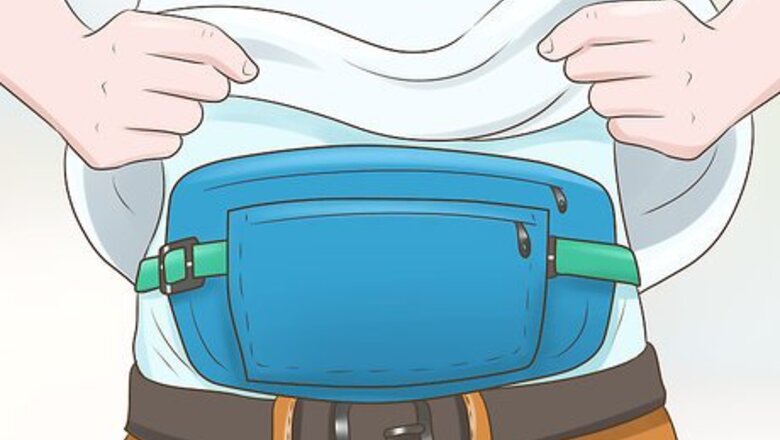
views
Hiding Your Money
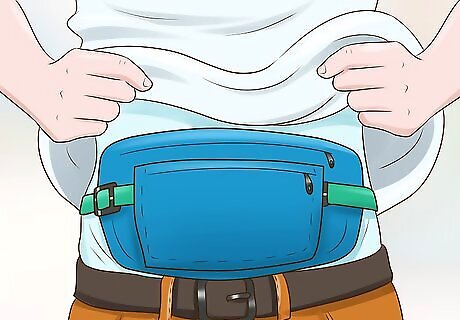
Wear a money belt. A money belt is a specialized accessory that is worn underneath your clothes. There are actual belts worn around the waist, and strap-on "pockets" that can be worn around the thigh. You can store valuables in it, like cash or important travel papers, and avoid having to carry any more cash than normal in your wallet. The advantage of a money belt is that it is virtually impossible to be pickpocketed, as the robber would have to lift up your shirt or pull down your trousers to access the belt (depending on where you wear it). The disadvantage, however, is that it can be difficult to access your own money without revealing to others that you are wearing a money belt. Money belts are available at many retailers, and through online markets. If wearing a money belt, always carry a little cash in your pockets or in an easily-accessible location to avoid revealing your money belt. You may also wish to excuse yourself and pop into a nearby restroom to take out the money you'll need before you complete a transaction.

Buy clothing with secret pockets. An alternative to a money belt is to wear clothing that has been built with hidden pockets. These articles of clothing come with a hidden compartment, typically sealable with a zipper or velcro, hidden where a thief would not expect there to be a pocket. Travel clothes with secret pockets are available at many retailers, especially those that focus on travel gear. Much like the money belt, it is best to keep a little cash on hand in your regular pockets or an otherwise accessible location. The key to hiding money effectively is to keep your cash out of view and tucked away where it can't be easily taken.
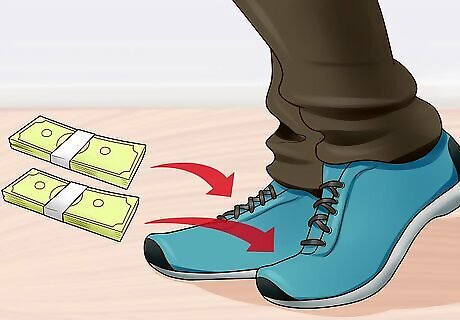
Hide some cash in your shoes. While it may not be feasible to carry very much money in your shoes, you may want to stash some money in one or both shoes, just in case your primary money location is found out. Some experts recommend folding up a $50 bill note in one or both shoes, deep in the toe area where the money will be safe. If hiding money in your shoe(s), do not use that money to pay for transactions. If people notice you taking off your shoe to retrieve money, they may quickly realize that there could be more money hidden on your person in other places.
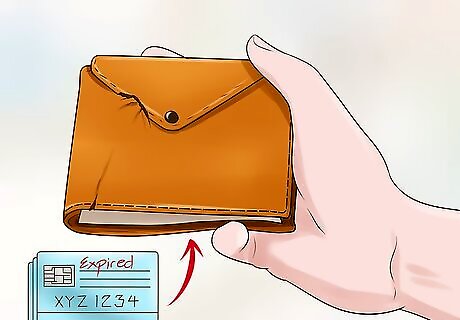
Consider carrying a decoy wallet. If you're worried about being robbed while carrying cash, you may want to carry a decoy or "dummy" wallet. This is essentially just a second wallet with a small amount of cash in it. The advantage to carrying a decoy wallet is that if you do find yourself being mugged, you can calmly hand over the dummy wallet with a minuscule amount of cash in it, and the robber will think that he has made off with your real wallet. As long as your real wallet is well-concealed and not easily detectable (in case the robber pats you down, for example), the person robbing you will have no reason to believe that the wallet he has is not your real, primary wallet. In order for the decoy wallet to be effective, your real wallet or money container should be exceptionally hidden. If the robber checks your pockets and your primary wallet can be plainly felt or seen, he may easily make off with both wallets. For this reason, you may wish to carry a decoy wallet in conjunction with a money belt. Use a cheap wallet for the decoy, ideally one that is old and beaten-up. It should be something you won't mind losing, yet something that looks like it's been carried around for a long time. To make the decoy wallet convincing, carry a few expired credit cards inside. That way, if the robber decides to look inside, he will think it is your real wallet.
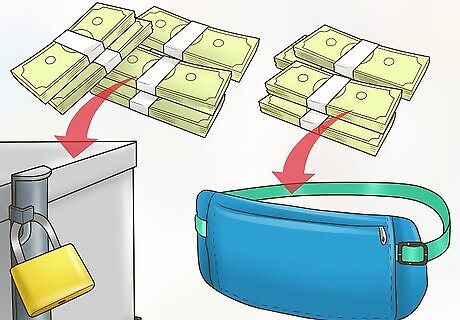
Divide up your cash. If at all possible, try to avoid carrying all of your cash with you at one time. Some methods of hiding your money can help, but if you do find yourself the victim of theft or robbery, you may be out of luck. Try dividing up your cash, and leaving some of it in a safe, secure location. If you're with others, consider asking them to carry a little bit of your cash, in case of an emergency. However, any cash that you give to others should be equally well-concealed in order to ensure your collective safety and prevent theft.
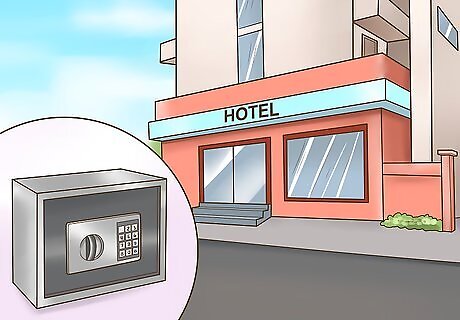
Store money at the hotel. If you're traveling and staying at a hotel, it may be a good idea to leave any non-essential cash at the hotel. If you're traveling with more than one credit/debit card, you can also leave the extra cards at the hotel. Ensure that your hotel has a secure safe in each room. Do not leave valuables unattended without properly storing them in a safe.
Staying Safe and Protecting Yourself

Avoid drawing attention to yourself. Whether you're a tourist, or simply carrying a large sum of cash on your person, the last thing you want to do is draw attention to yourself. Some people draw unwanted attention without even realizing it. To remain discreet while carrying money: don't wear fancy clothes or jewelry be careful about checking maps walk confidently like you know where you're going, even if you don't cover up any visible bulges in your pockets or under your clothing if using a secure pocket or money belt, resist the urge to repeatedly touch or check that hiding spot Do not leave your phone or belongings on any surface at a restaurant or any place as people can just grab it and run away.
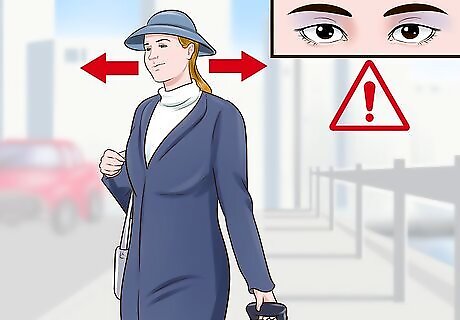
Be aware of your surroundings. If you're carrying a lot of cash, it's important to be constantly aware of where you are and who is around you. If you notice someone staring or watching you, or someone who suddenly looks away when you see them, be cautious of that person. They may be planning to rob you. Avoid high-risk, high-crime areas. You should also exercise great caution in known tourist areas. Be extremely cautious in metro stations and on public transportation. These places are prime pick-pocketing opportunities for thieves. If you feel someone jostle or "bump" into you, check your belongings to ensure you were not robbed. Do not walk alone while carrying cash. If you cannot find other friends to walk with you, then it may be best to take a cab to your destination. Just be sure that the cab is a legal, marked, authorized cab. You can increase the safety of a cab ride by calling to request a cab, rather than getting into a random taxi on the street. Remember that in spite of all precautions taken, anyone can be a victim anywhere at any time. Do not let yourself become overly confident or feel secure, as this is often the first step to letting down your guard.

Use discretion when handling cash. Counting money leaves you susceptible to a robbery, and it also gives a thief a visual clue as to how much money you're carrying. You should also avoid carrying more cash than you'll need, so try to plan ahead and know how much money you'll need. Carry small bills and coins in a separate pocket, so you don't need to make change for an unnecessarily large bill at the store. If traveling, exchange some of your currency at a reputable trader, like a bank or an official monetary exchange office. This will help protect you from getting ripped off, and will allow you to look like less of a tourist.
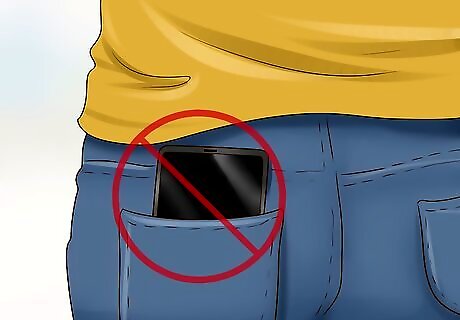
Keep electronics hidden. A surefire way to draw a thief's attention is by pulling out a flashy smartphone. You may not think anything of it as you text or check your email, but to a thief, having a smartphone may indicate that you also have cash or other valuables.
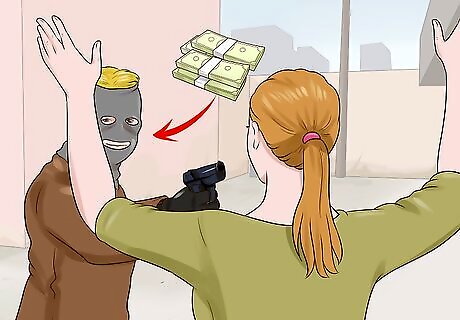
Remember your priorities. If the situation takes a turn for the worst and you do end up the victim of a robbery, do not resist or fight back. Comply with the robber, then leave the scene immediately and report the incident to a police officer. Remember that no amount of money is worth potentially losing your life over.
Finding Alternatives to Carrying Cash
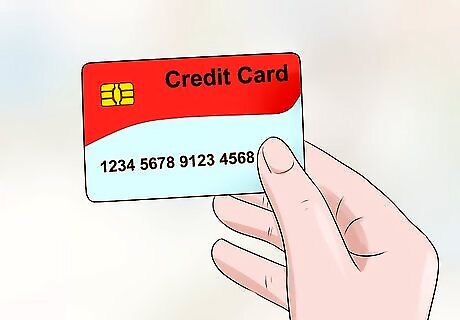
Carry a credit card. The advantage of carrying a credit card over a debit card or cash is that if the card is lost or stolen, your money is protected. A debit card could quickly give thieves access to your checking account, and if cash is lost or stolen you may never recover the funds. If carrying a credit card, consider buying a sleeve protector. Be sure that the protector you buy will effectively block radio frequency identification. This will help protect your card information from being stolen by "electronic pickpocketing." Only carry one or two credit cards with you at any given time if you're worried about your wallet getting lost or stolen.
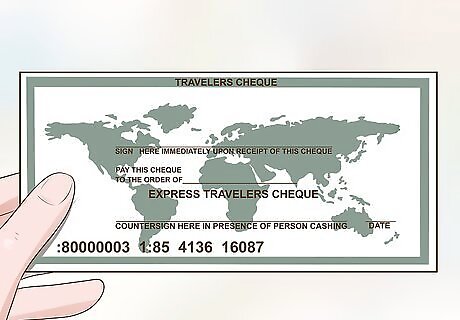
Use traveller's checks. Some merchants may not accept traveller's checks, which can create a bit of a headache when trying to make a purchase. However, traveller's checks have the distinct advantage of being easily replaced if they are lost or stollen. And even if a merchant won't accept them as payment, traveller's checks can easily be exchanged for cash (in the local currency) at most banks and money exchanges. If possible when traveling, get traveller's checks in the local currency. Carry several checks in smaller denominations to make transactions easier and safer. Sign your traveler's checks as soon as you get them, and keep the receipt(s) in a separate, secure location.
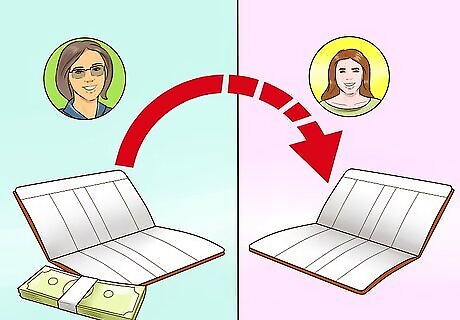
Have someone wire you money. If you're worried about bringing a significant amount of cash with you to a travel destination, you can always have a friend or relative wire you money once you arrive. These services are not free - in fact some charge rather high premiums - but most big-name money wire services have offices all over the globe, and using these services may take some of the stress out of traveling with cash.



















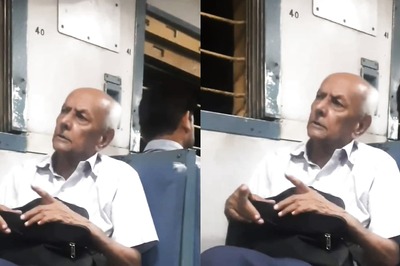
Comments
0 comment